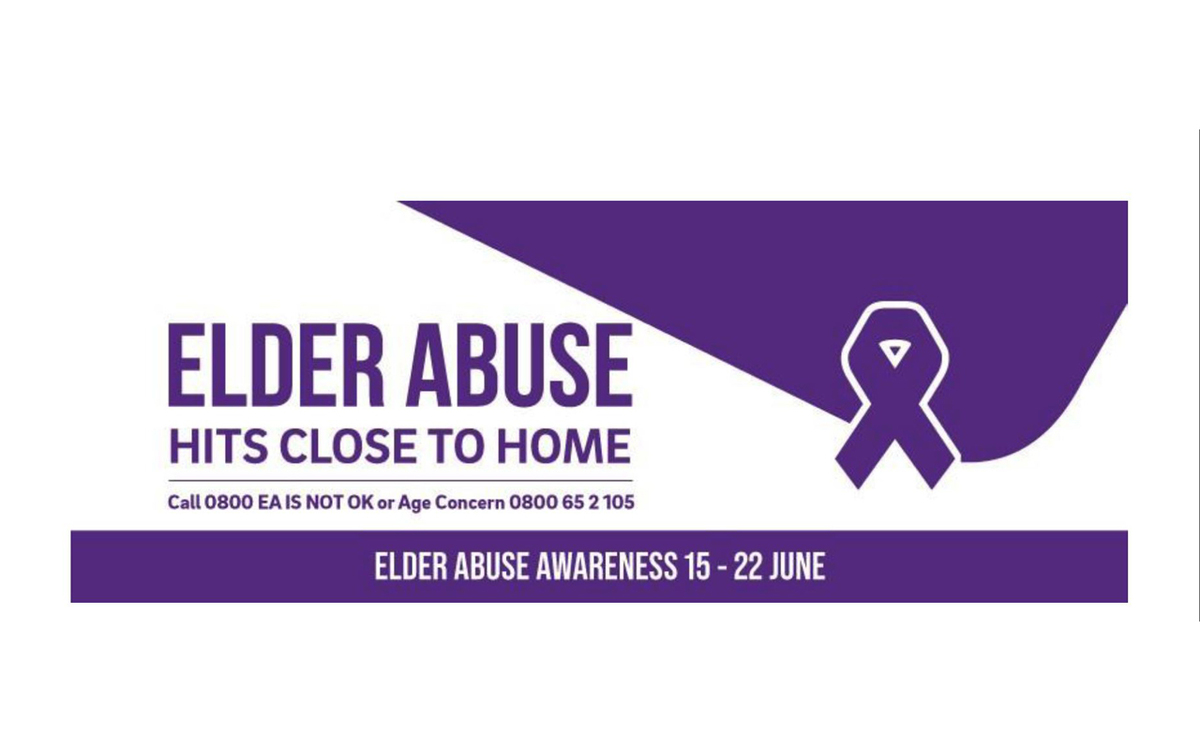Elder Abuse Awareness 15-22 June
Sponsored content / Published by Arrangement
17 June 2021, 1:11 AM

Elder Abuse Key Trends
For several decades Age Concerns in most regions of New Zealand have worked with older people and their families to reduce the harm of elder abuse and neglect. Their past year’s data is presented from the average of almost ten new cases each working day that Age Concerns dealt with.
Elder abuse is also identified by other agencies including iwi services, community agencies, health providers, the police, lawyers, banks and other businesses.
- 2411 cases were investigated by Age Concerns of which 75% had abuse substantiated.
- 44% of cases the older person was under 75 years of age.
- 36% of cases the older person was living alone but 54% live with partners and/or relatives.
These statistics include the period of Covid-19 alert levels 4, 3 and 2. The ‘be kind’ messages encouraged checking on older neighbours and people living alone. The community support was fantastic, but some elder abuse and neglect still happened. Living alone made some older people an easier target for abuse in having to rely on others for even basic needs like shopping and prescriptions. But elder abuse happens in households where others live too. Having a house to live in often keeps secrets hidden behind closed doors so that: “Elder Abuse hits close to home”.
- 88% of cases include psychological abuse.
- 44% of cases involve financial abuse
- 29% of cases involve neglect and self-neglect.
- 19% of cases involve physical abuse
For older people psychological abuse underlines the threats of physical violence, or the neglect of their physical and emotional needs. Financial abuse opportunities widened this year with bank closures and cheques disappearing. More older people must rely on guidance from others who can misuse bank cards, passwords, bank accounts, forge signatures on loan and guarantee documents. Covid-19 restrictions affected the livelihoods of many families, and older people tried to help their relatives through tough times. But when older people are pressured to sacrifice their own health needs, their house, car or their retirement income for the benefit of others: “Elder abuse hits close to home”.
- 79% of alleged abusers were family members of which 56% were adult children or grandchildren
- 74% of the alleged abusers are aged under 60 and 47% live with the older person
- 68% of cases the abuse has continued for longer than 3 months, and 32% longer than a year
Those who are most important in the lives of older people like family/whānau and friends override older peoples choices and needs. Relatives put their own needs first and disregard the rights of older people to make their own choices. Sometimes a relative, friend or neighbour disguises being friendly and supportive, but misuses the trust the older person had in them to steal from them instead. When an older person is coerced, isolated, threatened and manipulated, the abuse robs them of their self-esteem, independence and finances. This is usually done by someone an older person loves who visits or lives with them, which confirms that: “Elder Abuse hits close to home”.
Tony’s story
After Tony was widowed 6 years ago, he revised his will with the lawyer, and set up ‘enduring powers of attorney’ too - in case he ever became unable to make decisions for himself. Tony appointed his two children as ‘enduring powers of attorney’: his daughter for personal decisions, and his son for financial decisions. A year later Tony met June and was delighted when she moved in as she was a great cook and companion. Tony’s daughter was relieved that he was not lonely anymore, but hated June taking her Mum’s place in the family home. Tony’s son had a tourist business in ‘the islands’ so did not visit, but since the pandemic things were quiet, so he was ringing his Dad more often.
In January Tony had a stroke and ended up in hospital. He made progress initially, but the doctor advised that rehabilitation would longer so he would need rest home care for some months. As Tony’s speech was also affected, the medical certificate confirmed his ‘enduring power of attorney’ could be enacted.
After a month June was stopped at the door of the Tony’s rest home when she went on her daily visit. She was told that the enduring power of attorney had issued instructions that June could not visit Tony. She left shocked and embarrassed; then tried to ring Tony’s daughter who shouted down the phone at her.
June’s neighbour rang Age Concern for advice and the Age Concern worker arranged to meet. June was upset as she was bringing food for Tony that the dietician had suggested, helping Tony to improve enough for him to return home. Instead, she was being accused of trying to take over Tony’s house.
The Age Concern worker rang Tony’s son who asked “what’s going on? I am not allowed to talk to my father on the phone?”. The rest home staff were adamant in telling him that they had to abide by the enduring power of attorney’s instructions.
When the Age Concern worker talked with Tony’s daughter, she was angry that her father had given her brother a loan last year without telling her (when the lockdown had put his hotel business in jeopardy). Tony’s daughter was worried that all her Dad’s money would go to the rest home, resentful that June might take over his house and nervous that there would be no inheritance left for her.
The Age Concern worker explained that: Tony had rights too and he could indicate some choices even if he couldn’t speak clearly yet. The role of an enduring power of attorney was not to exclude Tony, but meant:
- consulting with Tony about any decisions needed,
- involving Tony is decisions as much as possible,
- asking for a medical review when Tony improves with his rehabilitation,
- acting in Tony’s best interests at all times.
Had his family or staff ever asked Tony if he wanted visitors, phone calls or who lived in his house?
Key messages
Campaign Messages
- Elder Abuse hits close to home
Unfortunately, Age Concern Elder Abuse statistics show:
- 86% of cases include psychological abuse
- 50% of cases involve financial abuse
- 81% of alleged abusers are family members
- 57% of the alleged abusers are adult children or grandchildren
- Alleged abusers are almost as likely to be female as male
Older people are valuable members of our society and should be treated with dignity and respect – yet every year, thousands of older New Zealanders are being abused, in many cases by family members.
It’s our collective responsibility as a community to ensure that older people are included and safe.
During the pandemic, New Zealanders have been asked to support older people in our neighbourhoods and many kind efforts have been made. But for some, elder abuse has worsened with the increasing
economic and social pressures that relatives have experienced. For many reasons elder abuse remains hidden and is not reported straight away, nevertheless older people are being hurt
emotionally, financially or physically.
What is elder abuse and neglect?
Elder abuse and neglect is a single or repeated act, or lack of appropriate action, occurring within any relationship where there is an expectation of trust, which causes harm or distress to an older
person.
This is a globally agreed definition that we in New Zealand adhere to. Age Concerns work towards reducing the harm and distress elder abuse and neglect causes older people to improve their
wellbeing and safety in their home.
About Elder Abuse Awareness Week 15-22 June 2020
The week starts on World Elder Abuse Awareness Day 15 June 2020. The campaign message for this year is: Elder Abuse hits close to home.
During the week of 15-22 June, usually local Age Concerns around New Zealand run events and activities in each region.
Due to the pandemic, this year most activities will be on-line. To find out what is happening nationally and in your own area, visit www.ageconcern.org.nz

